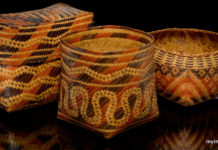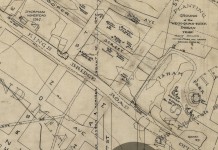
Imagine an Inwood Hill nearly stripped of trees. British and Hessian troops entrenched up and down the ridge. Common soldiers gathered around small cooking fires, shooting dice with repurposed musket-balls, the soft lead hammered into squares.
Not far off an officer pulls a corkscrew from his gear. Wine, increasingly scarce as the War dragged on, made service on the hill nearly tolerable. Stemware, liberated from civilians, adds a touch of civility to the affair.
Yes, even in time of war, there was drink to be had on Inwood Hill.
In 1913 a group of amateur archeologists found many a “dead soldier” in the former British encampment.
Below is a description of the find—ripped from the newspaper:

July 6, 1913.
New York Herald
July 6, 1913
Find Corkscrews of Vintage 1776
Relics of the Revolution Proclaim Prowess of British Soldiers Encamped at Inwood
Corkscrews proclaiming the valor of British troops as flagon men were unearthed last Sunday at Inwood in a quest for relics of the War of the American Revolution.

Long corkscrews, short ones and small folding ones were in the array which yesterday was presented for the inspection of the historian. The brave men who bore them are long since dust, and many a “dead soldier” was lying shattered in that same pit from which these reminders of merry bouts were dug. Buttons of the Seventy-first and the Seventeenth regiments were found among the shards where shattered wine glasses and once portly bottles were disclosed by the seekers.

Reginald Pelham Bolton, and other local historians who were present at the excavating are of the opinion that the British soldiery must have cast aside this valuable equipment about 1777 or 1778, for good wine can last forever and choice liquors at last grow scarce. The relics were found in a pit near the site of huts in which British warriors once lived.
These same gallant regiments were afterward captured at the Battle of Stony Point, and many were long imprisoned where they found little which reminded them of the conviviality of the good old days on the northern end of Manhattan Island.

The moralist may adorn the tale by saying that had it not been for the corkscrews they would not have fallen into the trap of patriot foe, or the easy-going philosopher may interpret them to mean that good wine strengthened them to avert an evil day. When the centennial of peace between Great Britain and the United States is celebrated good wines may yet be brought bubbling into the light of day by these very implements once held by the Redcoats of Old.








